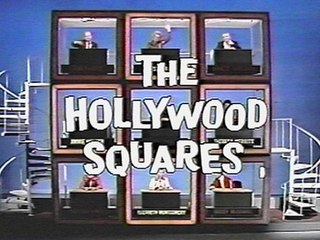
Hollywood Squares is an American game show in which two contestants play tic-tac-toe to win cash and prizes. The show piloted on NBC in 1965, and the regular series debuted in 1966 on the same network. The board for the game is a 3 × 3 vertical stack of open-faced cubes, each occupied by a celebrity seated at a desk and facing the contestants. The stars are asked questions by the host, and the contestants judge the truth of their answers to gain squares in the right pattern to win the game.

Pyramid is an American television game show franchise that has aired several versions domestically and internationally. The original series, The $10,000 Pyramid, debuted March 26, 1973, and spawned seven subsequent Pyramid series. Most later series featured a full title format matching the original series, with the title reflecting the top prize increase from $10,000, $20,000, $25,000, $50,000 to $100,000 over the years. The game features two contestants, each paired with a celebrity. Contestants attempt to guess a series of words or phrases based on descriptions given to them by their teammates. The title refers to the show's pyramid-shaped gameboard, featuring six categories arranged in a triangular fashion. The various Pyramid series have won a total of nine Daytime Emmys for Outstanding Game Show, second only to Jeopardy!, which has won 13.

Blockbusters is a British television game show based upon an American game show of the same name in which contestants answer trivia questions to complete a path across or down a game board of hexagons. The programme premiered on 29 August 1983 on ITV and ran for ten series, ending on the ITV network on 19 May 1993. Blockbusters was revived for four additional series, the most recent of which aired on Challenge in 2012.
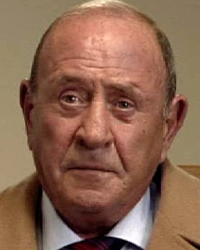
Michael Reid was an English comedian, actor, author and occasional television presenter from London, who is best remembered for playing the role of Frank Butcher in EastEnders and hosting the popular children's TV show Runaround. He was noted for his gravelly voice and strong Cockney accent.

Celebrity Squares is a British comedy game show based on the American comedy game show Hollywood Squares. It first ran from 20 July 1975 to 7 July 1979 and was hosted by Bob Monkhouse, then from 8 January 1993 to 3 January 1997 and was also hosted by Monkhouse.

Multi-Coloured Swap Shop, more commonly known simply as Swap Shop, was a British children's entertainment programme that was broadcast on Saturday mornings on BBC1 for 146 episodes in six series between 1976 and 1982. It was ground-breaking in many ways: by being live, being nearly three hours in length, and using the phone-in format extensively for the first time on TV.
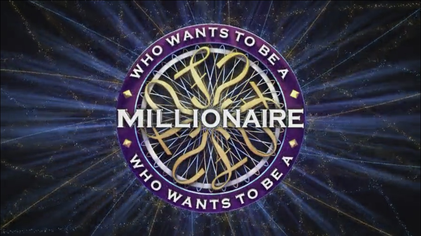
Who Wants to Be a Millionaire? is a British television quiz show, created and produced by David Briggs, and made for the ITV network. The show's format, devised by Briggs, sees contestants taking on multiple-choice questions, based upon general knowledge, winning a cash prize for each question they answer correctly, with the amount offered increasing as they take on more difficult questions. To assist each contestant who takes part, they are given three lifelines to use, may walk away with the money they already have won if they wish not to risk answering a question, and are provided with a safety net that gives them a guaranteed cash prize if they give an incorrect answer, provided they reach a specific milestone in the quiz.
Connections is a British game show that aired on ITV from 13 May 1985 to 6 June 1990. The daytime version is hosted by Sue Robbie from 1985 to 1988 and Simon Potter from 1989 to 1990, while the primetime version is hosted by Richard Madeley.
Sale of the Century is a British game show based on a US game show of the same name. It was first shown on ITV from 9 October 1971 to 6 November 1983, hosted by Nicholas Parsons. Special edition Celebrity Sale of the Century aired occasionally, starting on 2 January 1981 with Steve Jones as a host. The first series was supposed to air only in the Anglia region, but it rolled out to other regions since 8 January 1972 and achieved full national coverage by the end of 10 May 1975, at which point it was one of the most popular shows on the network – spawning the often-mocked catchphrase "and now, from Norwich, it's the quiz of the week." Since Norwich was considered something of a backwater compared to London, it was often used ironically.
Winner Takes All was a game show that aired on ITV from 20 April 1975 to 28 June 1988, first hosted by Jimmy Tarbuck from 1975 to 1986 and then hosted by Geoffrey Wheeler from 1987 to 1988. The show then returned on the screens in 1997, this time on Challenge TV hosted by Bobby Davro.

Wheel of Fortune was a British television game show based on the American show of the same name created by Merv Griffin. Contestants compete to solve word puzzles, similar to those used in Hangman, to win cash and prizes. The title refers to the show's giant carnival wheel that contestants spin throughout the course of the game to determine their cash and/or prizes. The programme aired between 19 July 1988 and 21 December 2001 and was produced by Scottish Television (STV) for the ITV network - having effectively replaced Now You See It as STV's prime time game show offering for the ITV network. It mostly follows the same general format from the original version of the programme from the United States, with a few minor differences.
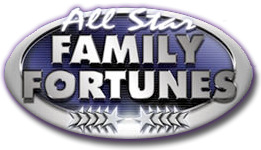
All Star Family Fortunes is a British television game show broadcast on ITV and presented by Vernon Kay which began airing on 28 October 2006 and ended on 14 June 2015 after its twelfth series. It is a celebrity revival of the original Family Fortunes that aired from 6 January 1980 until 10 January 2003, which is based in turn on the American game show Family Feud.
An Audience with... was a British entertainment television show produced by London Weekend Television, in which a host, usually a singer or comedian, performed for an invited audience of celebrity guests, interspersed with questions from the audience, in a light hearted revue/tribute style.
The Saturday Banana was a Saturday morning children's television show produced by Southern Television for ITV and presented by Goodies star Bill Oddie. Oddie also wrote and sang the theme tune. The series began on 8 July 1978, running through the summer and continuing up to December, with a Christmas Special.
Sheila Reid is a Scottish actress, known for playing Madge Harvey in the ITV sitcom Benidorm (2007–16). An original member of the Royal National Theatre in 1963, she played Bianca in the National's 1965 film version of Othello, with Laurence Olivier in the title role. Her other film appearances include Brazil (1985), The Winter Guest (1997) and Containment (2015).

The Chase is a British television quiz show broadcast on ITV and hosted by Bradley Walsh. Contestants play against a professional quizzer, known as the "chaser", who attempts to prevent them from winning a cash prize. The chasers are Mark Labbett, Shaun Wallace, Anne Hegerty, Paul Sinha and Jenny Ryan. Labbett and Wallace have both been chasers since series 1, while Hegerty joined in series 2, Sinha in series 4 and Ryan in series 9.
How was a British educational television show created by Jack Hargreaves. It was produced from 1966 by Southern Television, for whom Hargreaves was a presenter and deputy programme controller. It lasted until 1981, when the company lost its franchise to TVS.

Ant & Dec's Saturday Night Takeaway is a British television variety show, created and presented by Anthony McPartlin and Declan Donnelly, and broadcast on ITV since its premiere on 8 June 2002, enduring a three-year hiatus between 2010–2012, while its presenters worked on other projects. The show's format, heavily influenced by previous Saturday night light entertainment shows such as Noel's House Party, Opportunity Knocks and Don't Forget Your Toothbrush, focuses on a mixture of live and pre-recorded entertainment and quiz segments, including an audience-based quiz involving the television adverts during a week's episode of one of ITV's programmes, and a competition in each series between the two series.
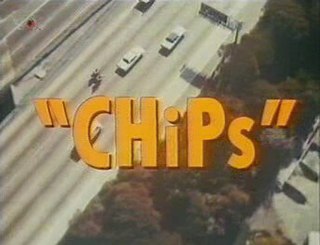
CHiPs is an American crime drama television series that originally aired on NBC from September 15, 1977 to May 1, 1983. It followed the lives of two motorcycle officers of the California Highway Patrol (CHP). The series ran for 139 episodes over six seasons, plus one reunion TV movie in October 1998.














